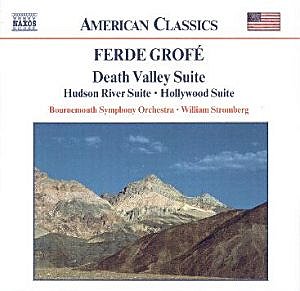************************************************************** EDITOR’s RECOMMENDATION October 2002 **************************************************************
Ferde GROFÈ
Hollywood Suite; Hudson River Suite; Death Valley Suite
Bournemouth Symphony Orchestra conducted by William Stromberg
NAXOS 8.559017 [56:14]

Ferde Grofé is best known as the composer of the Grand Canyon Suite. So this compilation of equally evocative, yet less familiar music is most welcome particularly in such energetic, vibrant readings as these by William Stromberg who, through his Classic Film Score recordings for Naxos's sister company Marco Polo, is no stranger to film music fans.
Of immediate interest is Grofé's Hollywood Suite. This is ballet music, performed by a large orchestra, tracing the production of a typical Hollywood musical; the heroine is the stand-in with the real talent. The star, seen only in close-up, gets the adoration, while the stand-in does all the hard work. She goes home forgotten as the cleaners sweep the studio floor ready for tomorrow's takes. The suite is presented in six movements. The first is entitled, 'On the set – Sweepers' with the sweeper (cue: sand block) in the morning preparing the empty sound stage 'unconcerned as the swinging pendulum of a clock'. The orchestration not only literally captures this sweeping but it also intimates through its brassy, jazzy abrasiveness, the false glitzy world of Hollywood, that the understudy/double/stand-in has entered. She remains attracted by its glamour, tamed by her hunger for success and still hopeful as her innocent, dreamy music for 'The Stand-In' plainly shows. The mood is brought down to earth with the mercurial 'Carpenters and Electricians' as they scurry around the set to scatty fanfares and skittish xylophone figures. 'The Preview' is all sophisticated gloss, the sort of fluffy music Waxman or Steiner would have scored for a romantic comedy. 'Production Number' is just that, the sort of dance routine one associates with any Hollywood musical, glamorous, scintillating; just listen to those tap-dancing feet. The final movement, Director- Star-Ensemble has all the grandiose portent, the sweeping romanticism of all those big Golden Age scores: heroic, romantic brass, cascading strings – sheer razzmatazz. This suite really leaves you breathless with admiration – a huge nostalgic wallow. Grofé's Hollywood Suite very enthusiastically played by the Bournemouth SO is worth double the price of this album alone.
And yet there is more! The Hudson River Suite is another wonder from the magic colourful pen of this American composer of the musical travelogues. The opening movement, 'The River' is a fond, almost patriotically fervent evocation of the lower reaches of the Hudson River taking in its "broad, sweeping majestic flow before it reaches the Atlantic taking in the colourful cliffs and woodlands of the palisades along its shores." The second movement, in heroic mould, 'Henry Hudson' is a musical portrait of the renowned explorer. 'Rip Van Winkle' is one of Grofé's musical pantomimes/caricatures. You hear Rip's dog barking (literally) as Rip whistles for him. You meet the dwarves playing nine-pins with the rolling of their balls sounding like thunder. Rip's twenty years slumber follows after he joins in their festivities. 'Albany Night Boat' reflects the moonlight night aboard the boat. As it glides smoothly over the waters, a small jazz band, on deck, begins to play romantically, nostalgically, and upbeat amid laughter and dancing. The concluding movement, 'New York,' brings commotion and excitement, the turbulence of heavy traffic and big business. A proud, unconquerable conclusion.
'Death Valley Suite' is another extraordinarily realistic sound portrait. Death Valley, a bleak and beautiful wilderness, is located largely in Southern California. The first movement 'Funeral Mountains' is painted in shimmering tones that reflect the heat haze and the region's desolate grandeur taking in both the merciless rays of high noon and the purple shades of night. In '49er Emigrant Train' you hear the crack of the whips the pleading, protesting neighing of the horses, the creaking of dried axles and the scraping of the wagon wheels as the settlers toil over this hostile landscape, then come the injuns!! Yet in spite of all these difficulties, the indomitable spirit of the pioneers urges them onwards. In 'Desert Water Hole', they are exhausted and parched, suddenly the oxen smell water; and animals, men and women, dash for the waterhole. Everybody celebrates enthusiastically – all this is vividly realised in Grofé's rousing music. But yet another crisis looms – a 'Sand Storm'. Grofé's wind machine, surging strings and rattles spin and spiral the sand to engulf the pioneers yet they emerge triumphant, stronger for their ordeal to build a new civilisation in the wilderness.
Magnificent over-the-top; but hugely enjoyable, vividly descriptive music played with all the stops out by film music conductor Stromberg and recorded in some of the best Naxos sound I have yet heard. Don't hesitate, buy it before it sells out!
Ian Lace

Return to Index